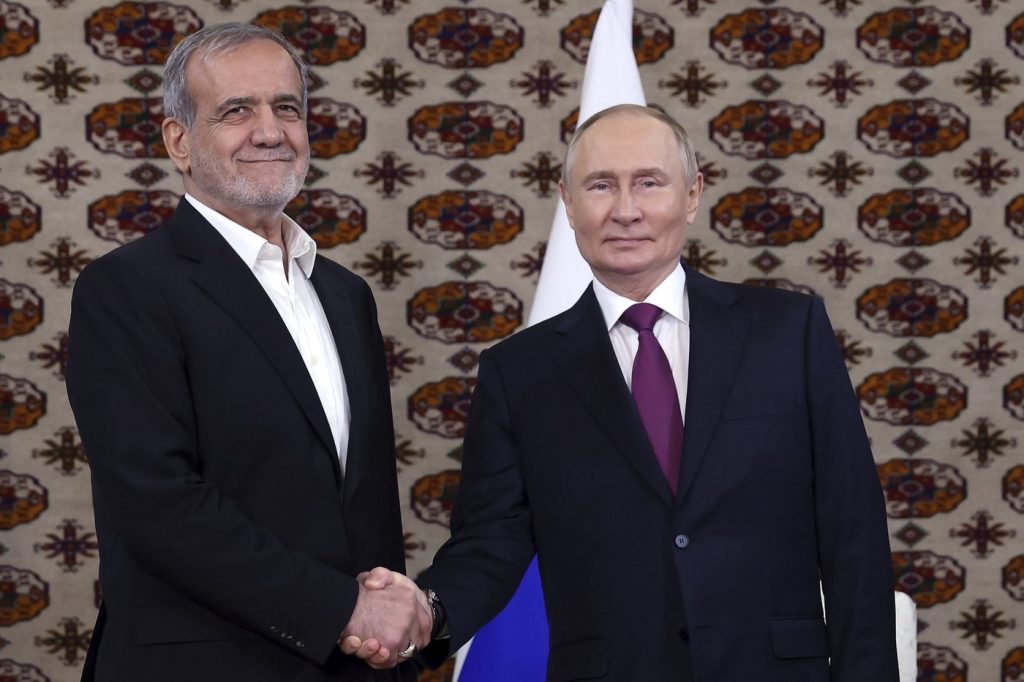MOSCOW (AP) Iranian President Masoud Pezeshkian arrived in Russia on Friday to sign a comprehensive cooperation treaty aimed at addressing his country's escalating economic challenges and various other issues. This visit marks Pezeshkian's third meeting with Russian President Vladimir Putin since taking office in July.
In a ceremonial gesture, Pezeshkian laid a wreath at the Unknown Soldier's Tomb at the Kremlin Wall before engaging in discussions with Putin. Kremlin spokesperson Dmitry Peskov emphasized that the planned "comprehensive strategic partnership treaty" encompasses a wide array of areas, including trade, military cooperation, science, education, and cultural exchanges.
The timing of this treaty signing is notable, occurring just ahead of the January 20 inauguration of U.S. President-elect Donald Trump, who has signaled intentions to adopt a firmer stance toward Iran and work toward peace in Ukraine. However, Peskov dismissed suggestions of a direct correlation between the treaty signing and Trump's inauguration, asserting that the agreement had been in the works for a considerable time.
Iran's membership in the BRICS bloc of developing economies, which Pezeshkian attended during its summit hosted in Kazan, Russia, last year has further solidified the country's position on the global stage. Historically, Russia and Iran have navigated a complex relationship, marked by tension in the past, but have cultivated a more amicable partnership since the Soviet Union's collapse in 1991. Moscow has become a crucial trade ally and supplier of military technology to Tehran, especially amid ongoing international sanctions against Iran.
Russia has played a pivotal role in Iran's nuclear energy development, constructing the nation's first nuclear power plant, which became operational in 2013, and is currently working on two additional reactors. Additionally, Russia was a key participant in the 2015 nuclear deal with Iran, crafted alongside six other world powers, which aimed to provide sanctions relief to Tehran in exchange for limiting its nuclear program. The Kremlin's support for Iran intensified following the U.S. withdrawal from the agreement during Trump's first term.
Since the beginning of the Ukraine conflict in February 2022, Russia's relationship with Iran has deepened further. Ukraine and Western nations have accused Iran of supplying Moscow with drones for use against Ukrainian forces, allegations both nations have denied. Moreover, Russia and Iran have collaborated to bolster the regime of Bashar Assad amidst Syria's ongoing civil war.
However, recent military advancements by opposition forces have posed new challenges, culminating in Assad's regime facing significant threats. This shift in the regional balance has strained Tehran's so-called "Axis of Resistance," particularly as Israel has conducted offensives against Iranian-backed groups such as Hamas in Gaza and Hezbollah in Lebanon, and has attacked Iranian assets directly on multiple occasions.
As Iran confronts widespread economic troubles and setbacks in its influence within the Middle East, it is increasingly reliant on Russian support. The situation is likely to become more precarious if Trump adopts his previous "maximum pressure" approach upon returning to the White House. In light of these security challenges, Iran is particularly interested in acquiring advanced Russian military capabilities, including long-range air defense systems and fighter jets, to counter potential Israeli attacks.










